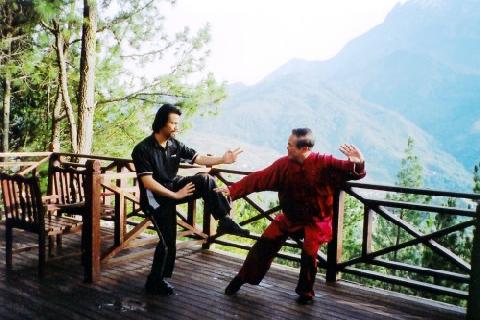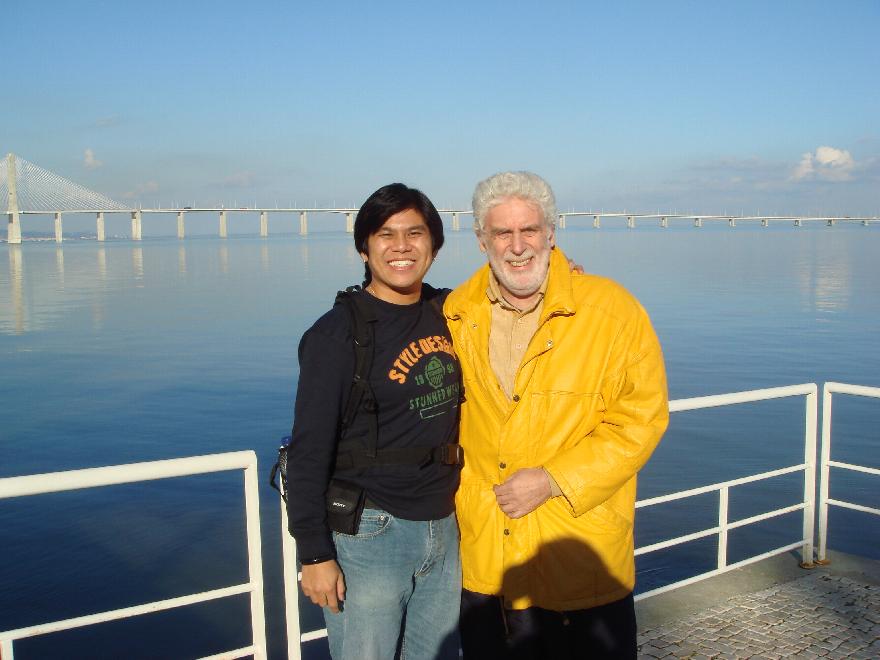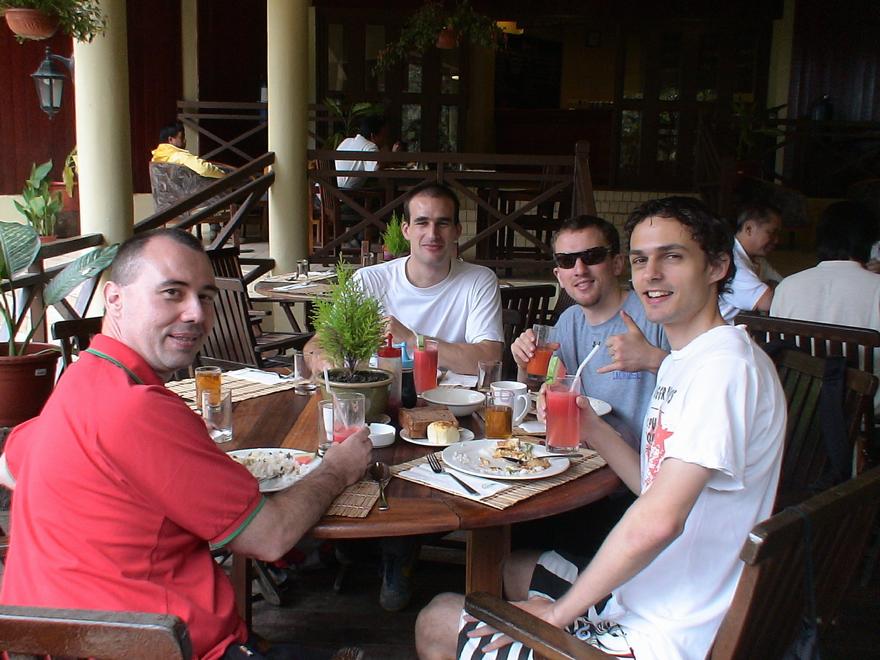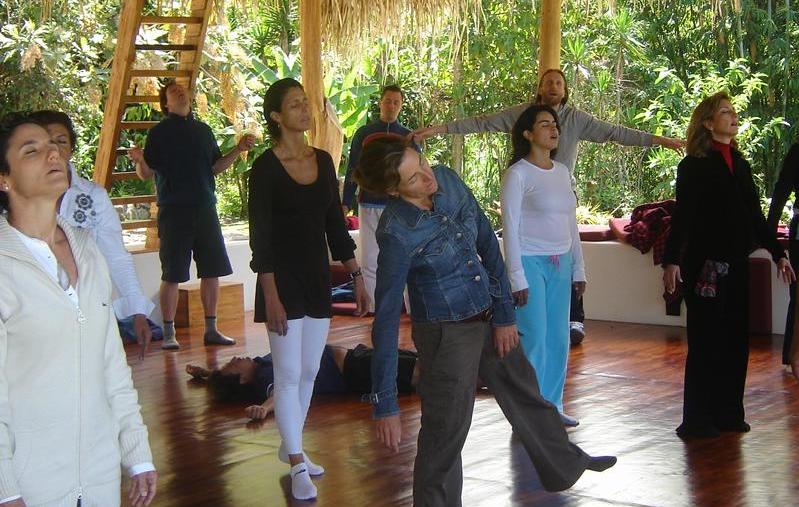SELECTION OF QUESTIONS AND ANSWERS
JANUARY 2012 PART 3

Traditionally anyone below 45 was considered too young to be a real kungfu master
Question 1
I have been practicing martial arts for over 20 years. It is a pity I only know about your kungfu now when I am already 44.
— Surguey, Russia
Answer
44 is a good age for you to start practicing our kungfu, whether it is Shaolin or Taijiquan. Traditionally, kungfu masters are over 45, and the older they get the better they become. Below 45 they are considered too young to be able to become masters.
The hallmark of great kungfu is internal force. Generally it takes about 15 years of daily training to acquire the type and amount of internal force that makes one's kungfu great. His sifu does not generally teach him internal force when he starts his kungfu career. Usually it takes at least 10 years for him to earn the trust of his sifu to have the rare opportunity to learn internal force.
Hence if a person starts kungfu at 20, if he is lucky enough to be selected to learn internal force after 10 years with his sifu, and if he is dedicated enough to practice it every day for 15 years, he will be 45 when he becomes a real kungfu master.
But situations are different in our school. You don't need 15 years to develop your internal force to a reasonably high level. 3 years would be quite sufficient.
It is actually ridiculous -- in a good sense. Others may not believe us, and many may accuse us of being boastful, but it is true that our students may achieve more in internal force in one year than many other students in ten. Take this class of Cosmic Shower, for example. If other people can attain in 10 days of training the type of internal force you have attained just now, it would be fantastic result. But you have attained it in one day. It is not an accurate comparison but it gives a good idea that our methods are 10 times more cost-effective.
Question 2
What are the youngest age and the oldest age to practice chi kung and kungfu?
Answer
Much depends on the school concerned. If a school teaches chi kung exercises that place much importance on mental aspects, like Abdominal Breathing and Cosmic Breathing, children are not suitable as they lack the mental discipline to perform these exercises properly. If a school teaches kungfu forms that demand a lot of acrobatic movements, like Tantui and Monkey Style, elderly people are not suitable as they lack the flexibility and agility to perform these movements.
But if you refer to our school, there are no age limits because we have a wide range of chi kung and kungfu exercises to suit every age. My youngest student was a 3-momth old baby. She was born with restricted arteries, and her doctors recommended surgery. Her mother, however, preferred chi kung. She recovered and has grown up as a healthy young woman. You can see a picture of her with me when she was eleven posted in my website.
My oldest student was 85 when he first learned chi kung from me. His heart problems were so bad that he could not walk out of his room. So he invited me to his apartment in New York to teach him. He regained good health, and two years later when he was 87 he traveled half the globe alone to learn Shaolin Kungfu from me.

The hallmark of internal force is not just breaking bricks but having good health and vitality, as evident in sifu Wong Chun Nga and Sifu Riccardo Salvetore above
Question 3
My wife was very happy doing Lifting the Sky, Carrying the Moon, and Pushing Mounting. Suddenly in August 2010 she became very much out of breath and she could hardly move.
At the hospital she had an operation and she got a Pacemaker installed in her breast. The doctors could not find an explanation to what had happened.
Qigong practice went to a stop for the both of us. My wife is very scared that the strong self induced movements are the reason for her situation. and she dare not practice any more. But she wants to. She loved the Shaolin Qigong very much.
So please Sifu Wong what do you think? Can qigong be a reason for her heart problems
— Jan, Sweden
Answer
Qigong (Chi Kung) cannot bring any harmful effects if practiced correctly. But wrong practice may result in adverse effects. Without seeing your wife it is hard to tell whether she has practiced wrongly.
Question 4
Do you think she can take up qigong once more without fear? Can it worsen her situation? She is in an extremely good condition right now.
Answer
Yes, she can take up qigong again without fear. Of course she has to practice correctly. I believe both you and your wife learned from my books. Although you had good results initially, it does not mean that subsequently you might have practiced wrongly.
It is best if you and your wife can attend my Intensive Chi Kung Course, which can make you young like 50 though you are over 70. Please see my website for details.
If it is not feasible for you to go to Malaysia, you can learn from Sifu Markus Kahila, our certified instructor in Finland.

When food comes, enjoy it. That is Zen.
Question 5
The Zen of Vajrayana indeed was referring more to the practices (meditation) rather than the school. At first brush, it just seems a maze weaving through the development of Vajrayana in Tibet and the role of the Lama. I was hoping that there was a "Zen like path" to cut through this "maze". Anyway I am positive that during or after the course I will get additional insights on how to proceed.
— Robert, Malaysia
Answer
The Zen path is simple, direct and effective. There were a lot of examples in the Intensive Chi Kung Course. Take "Lifting the Sky" as an example. The technique is simple, in fact so simple that some people wonder whether it will bring the result that we say it will bring.
Our practice was direct. We did not, for example, took half an hour to warm up, as some people would do practicing their exercises. We went into a chi kung state of mind, which is an integral part of the technique, and perform the necessary simple movements.
The practice was effective. We did not have to wait for a few months to find out whether the exercise produce the result it was meant to. We did not even wait for three days. As soon as we completed the exercise we went into chi flow, which was the desired result.
This Zen path of being simple, direct and effective can be applied to the "Zen of Vajrayana" or to any aspects of our daily life. For example if you wish to practice any Vajrayana meditation for any specific result, like being mentally fresh, you choose in a simple way a method which you believe would give you the desired result.
For this purpose, you need not worry about how Vajrayana developed in Tibet, or what the role of a Lama is. You practice the method as described. You need not concern yourself with other meditation methods or any Vajrayana rites. Then you access whether you have become mentally fresh as a result of your practice.
If you wish to take your wife to a favorite restaurant for dinner, you tell her in an appropriate way that you would love to take her to the restaurant for dinner. You need not, for example, describe to her how that restaurant was founded or that eating in that restaurant is more interesting than walking along a beach.
When she agrees, you drive her there, or let her drive you, but not, for example, debating for half an hour who should do the driving. At the restaurant you should be enjoying the dinner with your wife, and not, for example, arguing how the two of you should spend your money, or worse spending your time flirting with some pretty waitresses. This is the Zen path of being simple, direct and effective to enrich our daily life.
Question 6
I know that attending the Intensive Chi Kung course is an important first step. Beyond this, I hope that Sifu has some advice.
Answer
Yes, learning from me is just the first step. The more important subsequent steps are to practice what you have learnt at the course, and access the results with reference to your aims and objectives.
It is only logical that one will obtain the best results by practicing the exercises according to how they were taught by the master. But some students do not practice the exercises according to the master's teaching, they practice the exercises according to the way they think the exercises should be performed.
For example, the master asks them to practice once or twice a day, each session lasting about 15 minutes. They practice once a while, each time lasting about an hour. The master asks them not to worry or intellectualize during practice. But they worry whether their forms are perfect, and intellectualize why their chi flows the way it does. Such students would not have good results; they may have adverse effects.
While you should not worry about or crave for the results, it will be beneficial if you periodically access your practice with reference to your aims and objectives. Aims are general and long-term, whereas objectives are specific and measurable in a shorter time.
For example, you may aim to increase your mental clarity and vitality, and your objectives may be to understand whatever you read more efficiently, and to have energy to enjoy your wife's company when you return from work. After, say, three months of daily practice, you can easily know whether you have fulfilled your objectives. This will also give you a good ideal how well your long-term aims will be achieved.

Learning from Grandmaster Wong is the first step. The more important step is to practice diligently.
Question 7
From my simple practice of some short forms taught by a qigong master, I have started to have a taste of moving with chi. Recently I tried out some of the forms from Dragon in Zen. I was pleasantly surprised by how different and powerful some of the Shaolin forms feel, e.g Two Tigers at the Ready, Reverse Hanging of Golden Lotus, compared to the feeling of internal flow of my current practise. This experiences have allowed me to have a deeper appreciation for the beauty and wonder of the arts Sifu is offering.
Answer
If you can derive such powerful results by practicing from my books, I am sure you have found the results much deeper and more beautiful after learning from me personally. This is a common feed-back many students have told me.
As they found learning from my books beneficial, they progressed to learning from me personally, knowing the results would be better, perhaps by two or three times. But when asked to compare the difference between learning from my books and learning from me personally, they said it was simply incomparable.
Question 8
How then should I proceed? Is there another course I should prepare for?
Answer
My often-quoted answer is "Very good. Carry on." I would also add the three golden rules of practice, namely don't worry, don't intellectualize, enjoy your practice.
There is no need to prepare for another course. The Intensive Chi Kung Course you attended is comprehensive, providing you with very cost-effective techniques and skills from fundamental to masters' levels. But if you like, you may repeat the course a few years later. You will find the repeated course much more beneficial, as many have done and found out.
I do not offer a Small Universe course regularly, but if I offer one, don't miss the opportunity to attend. This course is by invitation only, and many have expressed what a fantastic course it is.
LINKS
Selected Reading
- Can We Practice Iron-Wire and Wudang Taijiquan at the Same Time?
- The Use of Internal Force
- Entering Tao
- Pristine Joys
- An Expression of Joy and Excitement
